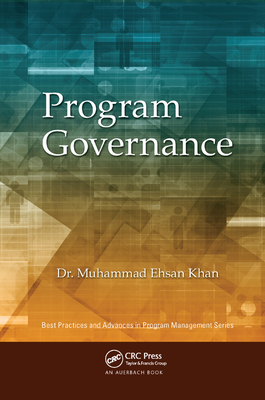Program Governance (Best Practices and Advances in Program Management Series)
暫譯: 程式治理(程式管理系列最佳實踐與進展)
Muhammad Ehsan Khan
- 出版商: Auerbach Publication
- 出版日期: 2014-09-19
- 售價: $3,270
- 貴賓價: 9.5 折 $3,106
- 語言: 英文
- 頁數: 220
- 裝訂: Hardcover
- ISBN: 1466568909
- ISBN-13: 9781466568907
-
相關分類:
專案管理 PM
-
其他版本:
Program Governance
海外代購書籍(需單獨結帳)
相關主題
商品描述
Although program management has received much attention in recent books, program governance remains a relatively new subject. While selected books and standards touch on this important topic, few are devoted to program governance as a subject. This book fills that need.
Program Governance provides a thorough understanding of governance while reviewing the underlying theories. The first book dedicated to this subject, it caters to the needs of practitioners, researchers, and students of management and governance.
The book provides a holistic view of program governance while covering multiple elements of program governance. Topics covered include the governance structure, governance roles, governance functions, governance mechanisms, factors influencing the governance framework, and different domains of programs that come under the jurisdiction of a governance framework.
The book presents the author’s own program governance framework, called the Contingent Governance Framework for Programs (CGFPrgTM), which is adaptable to suit different program contexts. This adaptability ensures that the different elements of governance, including structure and mechanisms, are aligned with program requirements. Such alignment results in an efficient and effective environment with an increased probability of program success.
The text supplies references to research and case studies to help readers understand key concepts in more detail. It also includes objectives at the end of each chapter to help readers gauge their knowledge of the subject.
The book clarifies the linkage/dependencies between program governance and other governance levels, such as international governance and corporate governance, which have a strong influence on governance framework for programs. It also explains the difference between the dynamics of temporary organizations, such as projects and programs, and permanent organizations. This distinction between temporary and permanent organizations provides readers with a practical understanding of how governance should be implemented in both types of organizations.
商品描述(中文翻譯)
雖然程式管理在最近的書籍中受到廣泛關注,但程式治理仍然是一個相對較新的主題。雖然一些選定的書籍和標準觸及這個重要主題,但專門探討程式治理的書籍卻不多。本書填補了這一需求。
程式治理提供了對治理的全面理解,同時回顧了其基礎理論。這是第一本專門針對此主題的書籍,滿足了實務工作者、研究者以及管理和治理學生的需求。
本書提供了程式治理的整體觀點,涵蓋了程式治理的多個要素。所涵蓋的主題包括治理結構、治理角色、治理功能、治理機制、影響治理框架的因素,以及屬於治理框架管轄範圍的不同程式領域。
本書提出了作者自己的程式治理框架,稱為「程式應變治理框架」(Contingent Governance Framework for Programs,CGFPrgTM),該框架可根據不同的程式背景進行調整。這種適應性確保治理的不同要素,包括結構和機制,與程式需求保持一致。這種一致性導致了一個高效且有效的環境,並提高了程式成功的可能性。
本書提供了研究和案例研究的參考資料,以幫助讀者更詳細地理解關鍵概念。每章結尾還包括學習目標,以幫助讀者評估自己對該主題的知識。
本書澄清了程式治理與其他治理層級之間的聯繫/依賴關係,例如國際治理和企業治理,這些層級對程式的治理框架有著強大的影響。它還解釋了臨時組織(如專案和程式)與永久組織之間的動態差異。這種臨時與永久組織之間的區別使讀者能夠實際理解治理應如何在這兩種類型的組織中實施。











